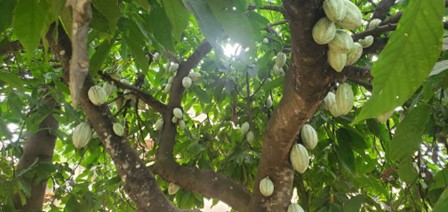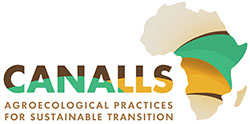Ntui, in the Central region of Cameroon, where 76.7% of the population grows cocoa, while food crops such as corn, cassava, and yams account for 3.3%, 16.7%, and 3.3% respectively.
Ntui covers 430 km2 with about 28,000 inhabitants. Ntui has a subequatorial climate of classic Guinean type with two rainy seasons and two dry seasons. Temperatures range from 26°C - 31°C, and the average annual rainfall is about 1400 mm. The main soil types are Ferralsols and Gleysols with pH ranging from 5.5 to 7 In terms of economic potential, the Ntui commune is mainly focused on trade and the exploitation of natural resources.
Cocoa is mainly grown in the agroforestry systems. Ntui presents forest-based cocoa agroforestry, savannah-based cocoa agroforestry, and transition zone-based cocoa agroforestry concerning ecological diversity. Cocoa activities usually start with the felling down of trees, followed by slash-and-burn and clearing which takes place in January, February, June, July, November, and December, while planting takes place between late February - early June, and late July - early November. Pruning, anti-capsid treatment, and brown rot treatment take place between January and February, and harvest usually starts from late October to late December. Cocoa plantations are composed of local and improved cocoa varieties. Farmers apply almost the same management techniques with slight differences at the level of the frequencies conditioned by ecological factors and financial abilities. Cocoa buyers in Ntui are mostly international organizations namely OLAMCAM, TELCAR, SIG CACAO, etc. Farmers mostly sell in cooperatives.

Annual food crops are managed in poverty through slash-and-burn, associated with conventional tillage, crop residue incorporation, crop rotation, and fallow. Here, farming generally begins with the conversion of native lands or fallow fields through slash-and-burn and clearing, and farm products are mostly sold in the local and regional markets.
Until the ALL was set up, farmers in Ntui had never heard of agroecology. However, 16% and 5% of households were already practicing recycling, using compost, manure or cow dung, and vegetable-based green manures in their farming systems. Producers from various localities in the council benefited from capacity building in good agricultural practices and integrated soil fertility management (2020-2022). In Ntui, stakeholders also expressed additional needs for capacity building on pollinator use and management, animal nutrition, good breed selection, and animal disease management. Group discussions revealed needs in new areas such as recycling, fertilizer production, irrigation, animal husbandry, and agroforestry.



